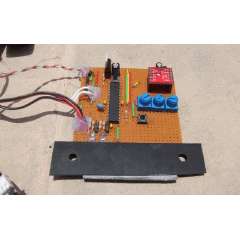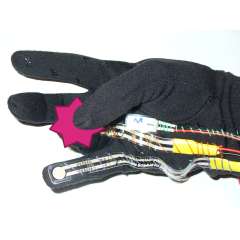Categories
- animatronics (12)
- apple (11)
- arduino (179)
- art (41)
- articles (121)
- artificial intelligence (11)
- automation (421)
- avr (205)
- bitcoin (3)
- breadboard (9)
- cameras (57)
- cars (26)
- cell phones (28)
- clothing mods (21)
- console mods (26)
- dangerous (94)
- desktop mods (24)
- embedded (5)
- flying things (54)
- fpga (22)
- gaming creations (108)
- interface (225)
- internet (17)
- laptop mods (6)
- lasers (22)
- linux (7)
- magnetic (3)
- medical (12)
- microcontrollers (51)
- misc projects (152)
- msp (12)
- music (124)
- pic (90)
- projects (23)
- pyroedu (76)
- raspberry pi (26)
- robots (312)
- security (36)
- sensors (307)
- software (200)
- solar (19)
- stamp (9)
- tools (149)
- tutorials (98)
- Uncategorized (45)
- usb (44)
- wireless (256)
Sponsors


Posted September 9, 2013 by Chris
“The purpose of this project is to aid the visually impaired with everyday tasks by providing more information to them about their surroundings. Typically, a person with no or poor vision will use a cane while walking to determine the general topography of the area.”

Posted August 30, 2013 by Chris
“In Yaw Control Part 1 I discussed how gyroscopes can be applied in Radio Controlled cars to reduce yaw under braking and acceleration. Since this first post I have developed an Arduino based yaw control system which goes beyond the original goals to address the major flaw in the gyro based approach.”

Posted August 22, 2013 by Chris
“We used two stepper motors to drive a steel ball scavenged from a ball-bearing…We also mounted a solenoid which raises and lowers a writing instrument. The device is meant to write on a sheet of paper…By using a mouse to control the robot, anyone can sit down and doodle remotely with it.”

Posted August 19, 2013 by Chris
“In this article we describe the control crawler platform from any Android-device, as well as viewing real-time video and rotation control pan/tilt of IP-Camera. All hardware has remained virtually unchanged in the first project CxemCAR, changes were made Android-applications to work with the Wi-Fi IP camera.”

Posted August 8, 2013 by Chris
“A while back, I did a wireless temperature sensor project using XBee radios….So I decided to try the same project using inexpensive RF devices. I used a 434MHz transmitter ($4) and receiver ($5) from Sparkfun, and had great success with these cheap devices. I also used a simple LM34 Fahrenheit temperature sensor, two Arduinos, and a two-digit LED display to show the temperature at the receiver end.”

Posted August 3, 2013 by Chris
“This time we are going to build a remotely controlled car robot, with the next list of features:
- -3 wheels – 2 in the front and 1 one rear.
- -On board camera
- -To mimic real cars, the car robot will have some lights
- -It will carry some sensors on board, which may be used for fun
- -To make it wireless, it will have a Wi-Fi module.”

Posted August 1, 2013 by Chris
“I’ve got a pre-paid electricity meter installed at my new place in Cape Town. It outputs a 1/1kWh pulse via a LED on the front panel. I thought it would be pretty cool to read and log the power consumption of my house. It’s also an excuse to play with WiFi and other fun stuff.”

Posted July 27, 2013 by Chris
“The goal of the Alaskan Ice Buoy project is to develop a buoy that collects environmental data from the Arctic and transmits that data back to Vermont. The project is also being used to gain experience with CubeSat Kit hardware, in hopes of using the CubeSat Kit platform to launch a satellite into space as a subsequent project.”

Posted July 26, 2013 by Chris
“The S/C structure resembles a cube of 60 cm side length and is based on a variant of the standard MicroSIL bus, built by SIL (Space Innovations Limited) of Newburry, Berks, UK, a commercial platform provider. The design is based around six honeycomb outer panels, and an interior double shelf, dividing the platform subsystems on the lower shelf from the payload instruments on the top shelf.”

Posted July 20, 2013 by Chris
“The SudoGlove is a gesture controller that can be easily interfaced with hardware or software via a wireless connection. The glove implements an array of sensors plus filtering circuitry and mathematical analysis firmware to derive state values for each sensor and transmits them to an authorized receiver.”






